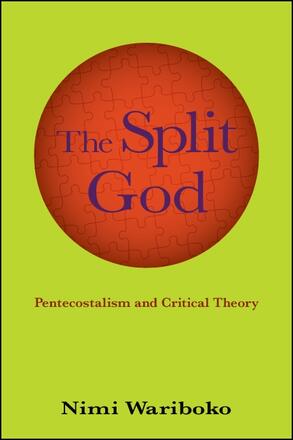
The Split God
Pentecostalism and Critical Theory
Alternative formats available from:
Offers a critical Pentecostal philosophy of God that challenges orthodox Christianity.
Description
Although Pentecostalism is generally considered a conservative movement, in The Split God Nimi Wariboko shows that its operative everyday notion of God is a radical one that poses, under cover of loyalty, a challenge to orthodox Christianity. He argues that the image of God that arises out of the everyday practices of Pentecostalism is a split God—a deity harboring a radical split that not only destabilizes and prevents God himself from achieving ontological completeness but also conditions and shapes the practices and identities of Pentecostal believers. Drawing from the work of Slavoj Žižek, Jacques Lacan, Jean-Luc Nancy, and Giorgio Agamben, among others, Wariboko presents a close reading of everyday Pentecostal practices, and in doing so, uncovers and presents a sophisticated conversation between radical continental philosophy and everyday forms of spirituality. By de-particularizing Pentecostal studies and Pentecostalism, Wariboko broadens our understanding of the intellectual aspects of the global Pentecostal and Charismatic movements.
Nimi Wariboko is Walter G. Muelder Professor of Social Ethics at Boston University.
Reviews
"This monograph makes a significant contribution to philosophical theology and critical theory. It fills a void—indeed, a split—that has existed between the academy and the Church." — Toronto Journal of Theology
"For anyone unfamiliar with Nimi Wariboko's work, this book is likely to be a surprise: radical, eclectic, speculative, creative, overlapping disciplines, shifting dialogue partners, and challenging established terminologies. Those familiar with his work, on the other hand, will add that Pentecostalism marks a consistent feature of this Nigerian-born Pentecostal economist, ethicist, and theologian. It is out of this deep-seated interest that the present volume engages two hitherto estranged conversation partners: Pentecostalism and critical theory. The result is a true tour de force." — PentecoStudies
"…[Wariboko] is a first for us in the Pentecostal guild as well as the Pentecostal world. He is the first to a) provide a thoroughgoing philosophical program, b) which unpacks the essence(s) of Pentecostalism, and c) is a philosopher of global significance d) doing first tier philosophical work." — Pneuma
"Even if most Pentecostals who pick up this book will not be familiar with the critical theoretical apparatus central to the dialogue, I suggest that we ought to stay with The Split God as long as we can. Doing so will extend our philosophical horizons, will stretch our theological considerations, and will deepen our appreciation of how our Pentecostal spirituality is rooted primordially in West African and sub-Saharan sensibilities as unveiled in this book. Critical engagement with Wariboko's arguments, methodological and theological, can arise only through, not around, The Split God." — Australasian Pentecostal Studies
"Not since the early work of Thomas J. J. Altizer has a theologian/philosopher opened such a radical new vision of reality with new language as Nimi Wariboko does in The Split God. Through an analysis of Pentecostalism, Wariboko creates a vivid, shocking theology that self-consciously repeats classical Christian orthodoxy (in some of its modes) while transforming it so as to make new sense of Pentecostal beliefs and practices. He mines the language of contemporary continental critical theory of the psychoanalytical and Marxist sort for resources to express his claim that God is split, not whole, reality both spiritual and material is split, not whole, society is split, not whole, and persons are split, not whole. What Pentecostalism does, he claims, is to unite these split parts into vital ways of living in the face of God without making them holistically coherent, just alive and vital." — Robert Cummings Neville, author of Defining Religion: Essays in Philosophy of Religion